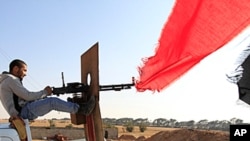An African Union summit has demanded an immediate end to NATO airstrikes on Libya, and backed a “Road Map” peace plan calling for a ceasefire and negotiations. A small but growing number of African nations are suggesting Moammar Gadhafi must be excluded from any peace deal.
The African Union Thursday endorsed its own peace plan for Libya.
The so-called Road Map drafted 2 ½ months ago calls for a ceasefire leading to talks on transforming Libya to a democracy. The plan had been effectively sidelined in the early days of Libya’s uprising as the UN Security Council took the lead with resolutions authorizing NATO airstrikes to protect civilians.
AU Peace and Security Commissioner Ramtane Lamamra says the summit’s vote of confidence in the Road Map, and a planned mission to Libya by South African President Jacob Zuma next week are evidence of intensified AU diplomatic efforts.
He says the Road Map envisions a new democratic state in Libya, just as the UN Security Council plan does, but without the bombing and fighting.
"We anticipate the birth of a Libya which would be fully consistent with the wishes of all the Libyan stakeholders. We stand for political reforms, democratic transformation, but we definitely stand for an immediate end to the killings and all kinds of violence," he said.
Libya’s rebel Transitional National Council has been cool to the Road Map because it does not require Moammar Gadhafi’s removal in the transition to democracy. Rebel representative Abdallah al-Zubedi says there can be no compromise on the question of Mr. Gadhafi’s ouster.
"We have repeatedly said that the regime is an obstacle to peace. We should reach an agreement where we can convince the regime to step down and continue to find a peaceful solution to the problem," he said.
AU diplomats attending the closed-door summit session say a small but significant block of leaders favored amending the Road Map to include a call for Mr. Gadhafi’s departure. Such a shift would be a setback to the Libyan leader, who has been an influential figure in pan-African politics for more than 40 years.
But Libya’s Foreign Minister Abdelati Obeidi said those advocating Mr. Gadhafi’s ouster are a small minority of the AU membership.
"Not many. I was there. It was only Senegal, maybe Gabon, Rwanda and Gambia, and as I said, even Gadhafi if he stays, other bodies will look after this political instrument [democratic reform], so I think the language that Gadhafi should leave the country is not logical," he said.
Obeidi, who led the Libyan delegation in Mr. Gadhafi’s absence, expressed hope that a united African diplomatic front could bring an end to the crippling NATO air strikes.
"It is a political step that must be taken to prove that Africans are united against this aggression. It is an aggression you know, it has nothing to do with protection of civilians," Obeidi said.
A group of 30 former African heads of state and leaders of major international institutions Thursday joined the AU summit's appeal for an end to NATO air strikes. The group, known as the Africa Forum, urged the international community to respect Africa’s responsibility to take the lead in resolving what is essentially an African conflict.
The United Nations has claimed authority in Libya through its charter, which gives the Security Council primary responsibility for resolving conflicts.
AU Summit Endorses Libya Peace Map, Demands Air Strikes Halt




